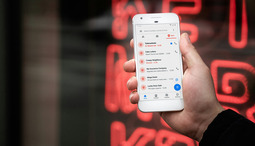- On
- 28 Oct 2025
- Reading time
- 4 minutes
Social media has become an important part of life in the current digital age. It completely embroils many aspects of daily life and, for many, is a major in both their personal and professional lives. Whilst social media at its very core can be a great thing, allowing connection and networking for people globally, it has become so much more than this.
Yet whilst there are many advantages to social media, there are also a number of risks. The most pressing negative of social media is its ability to suck users in and waste time, but other, less obvious issues carry risk when using social media, such as privacy and workplace harmony factors. We are going to take a look at what you can do to avoid falling into these pitfalls when you are using social media in the workplace.
1. Becoming Unproductive
The most important and immediate risk of social media is its ability to completely derail your attention. It is the perfect mechanism for taking over your attention and completely sidetracking individuals from the job at hand as they fall down the rabbit hole of scrolling. It can begin as a quick scroll during your break time before becoming an extensive indulgence into group chats, endless reels, and watching videos, which begin to chip away at working time. Without clear boundaries in place or a strict structure with alternatives provided, you risk losing all of your break time to social media.
There are a number of ways to try and avoid this during your break times. Actively scheduling time can be a good way to avoid losing productivity. This means that you limit social media use to only doing it during scheduled breaks at lunch or for coffee rather than pauses throughout the day to scroll. Instead, opting to use timers that limit access to social media or adopting ‘do not disturb’ times allows you to manage your time more effectively.
Actively scheduling your social media time can help you stay productive. During breaks, you might try walking, doing yoga, or exploring online entertainment such as watching short educational videos, listening to podcasts, or engaging in mobile gaming that stimulates your mind without disrupting your work focus.
2. Take Social Media Information With A Pinch Of Salt
Social media platforms can be the bearer of objective news that comes without the influence of other news outlets, but they can also be rife with opinions, unverified accounts, and exaggerations. The internet can be full of falsehoods and clickbait. It’s important to verify information, especially when it relates to workplace matters or interactions with colleagues.
With 90% of the UK population admitting to encountering wrong information online, you will want to protect yourself from this. Verifying sources for accounts and articles can be key to combating this. This means you are getting to the origin or reputable source without being led astray by unwanted interference. But it is not just up to verification, using your own brain and thinking critically about the information can also be worthwhile. If you see something particularly provocative, it can be worth taking a moment before engaging. It can be wise to avoid debating colleagues over unrelated external issues or sharing content that might hurt someone’s feelings at work.
3. Sharing Too Much
Never before have people been able to share as much about their lives and broadcast this to people they barely even know. Social media has created the opportunity for people to do this with ease. It has garnered a culture of oversharing and disclosing too much information to people not particularly close to you. This can typically be something that causes issues if you explore polarizing views and share these with colleagues or, worse, bosses. This could jeopardize your job and damage working relationships between you and clients or co-workers.
This is further compounded by issues surrounding a general blurred boundary in this modern era, whereby professional and private lives are getting increasingly mixed by social media. This unlimited connectivity can be great for organizing work drinks or even connecting with those in other departments, but what it can do is convey thoughts and feelings to everyone in work, which may expose you, cause grievances, and cross the work-private life line. Perhaps the two should be left in different spheres. Establish clear personal boundaries and policies. Consider making your account private or reducing your digital footprint. Think about what you are posting on social media. And for goodness sake, don’t post pictures on Instagram when you are allegedly on a sick day - 66% of Britons think this is a good idea!
Final Thoughts
Social media can be great. But blending social media with your working life can come with big problems. It can cause unproductivity, rifts in workplace environments, and a blurred boundary between the workplace and private lives. This can have profound impacts on workplace dynamics and relationships. By combating this using your initiative, making practical changes to your habits, and remaining aware of the impact of social media when at work, you are less likely to fall into these common pitfalls.








